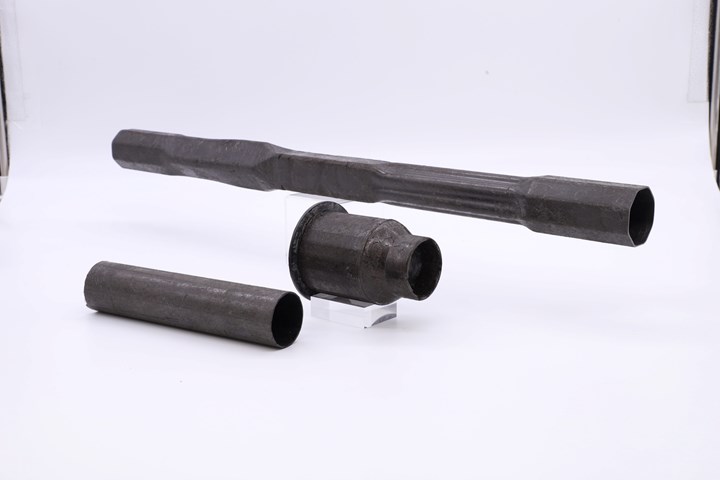Complex recycled CFRTP parts demonstrate discontinuous fiber advantages
CAMX 2023: herone GmbH is showcasing a set of tubes, shafts and profiles, all of which demonstrate the feasibility of rCF discontinuous fibers molded into complex thermoplastic composite parts.
Recycled carbon fiber-reinforced thermoplastic tubes, shafts and profiles. Photo Credit: herone GmbH
Besides herone GmbH’s (Dresden, Germany) standard high-performance thermoplastic and continuous fiber-reinforced hollow profiles, the company is launching a product branch with recycled carbon fibers (rCF), with a focus on complex-shaped parts. Available products are offered with an isotropic fiber architecture and a polyamide 6 (PA6), polyphenylene sulfide (PPS), polyetherimide (PEI) and polyetheretherketone (PEEK) thermoplastic resin matrix.
At CAMX 2023, herone is showcasing a set of different rCF products primarily based on a PPS resin system. They range from tubes and shafts with integral flanges to complex profiles with changing cross-sections along their profile axis. All of the products displayed are molded in one process step from an almost straight preform, demonstrating the advantage of rCF discontinuous fibers to mold complex composite parts.
Herone notes that, due to the discontinuous fiber length of recycled fibers, the performance of the final part may not mirror that of a continuous fiber-reinforced part. Nevertheless, use of discontinuous fibers gives the advantage of molding from less complex semi-finished parts to very complex final shapes, because the discontinuous fibers can “glide” to each other. Consequently, the company notes, composites with recycled fibers can enhance the application field and don’t need to compete (e.g., by price) against the traditional continuous fiber-reinforced composite material applications.
Today’s available semi-finished, hybrid thermoplastic rCF materials are limited in their level of orientation to provide high-performance, load-adapted fiber architectures. Herone has started to develop these materials further for highly orientated rCF pre-impregnated thermoplastic tapes. The company’s aim is to, within the next two year, provide the first rCF hollow part with highly aligned rCF-thermoplastic tapes.
Moreover, herone’s primary UD tape production waste is refurbished into tape chips and can be pressed or injection molded to functional elements, which are combined with the rCF profiles, further achieving zero waste production.
Related Content
-
Composites manufacturing for general aviation aircraft
General aviation, certified and experimental, has increasingly embraced composites over the decades, a path further driven by leveraged innovation in materials and processes and the evolving AAM market.
-
Carbon fiber, bionic design achieve peak performance in race-ready production vehicle
Porsche worked with Action Composites to design and manufacture an innovative carbon fiber safety cage option to lightweight one of its series race vehicles, built in a one-shot compression molding process.
-
Cryo-compressed hydrogen, the best solution for storage and refueling stations?
Cryomotive’s CRYOGAS solution claims the highest storage density, lowest refueling cost and widest operating range without H2 losses while using one-fifth the carbon fiber required in compressed gas tanks.

















